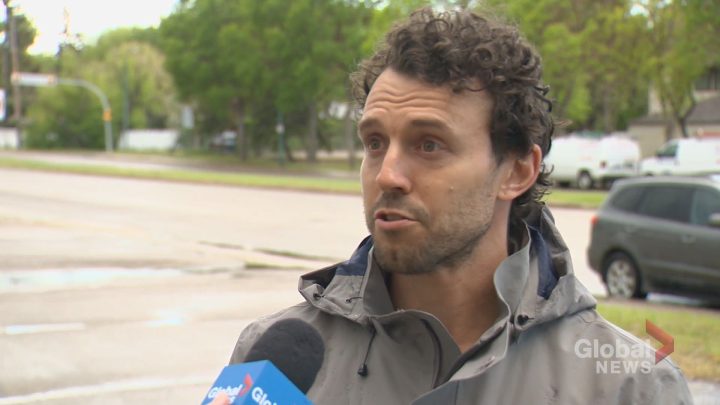Ward 6 Councillor Dan LeBlanc’s motion to get full operational funding in the 2023 budget to end homelessness in Regina passed with a unanimous vote in city council on Wednesday.

City administration will come back with a report on how the next draft budget will include investment ending homelessness in Regina.
Years after the debut of the five-year Plan to End Homelessness in Regina, a pair of councillors believe it’s time for the city to take the lead on actually achieving that goal.
“That’s a commitment the city made in 2018 that remains unfulfilled,” said Ward 6 Councillor Dan LeBlanc, who has teamed up with Ward 3’s Andrew Stevens on the Wednesday council agenda item.
“We have a motion coming to council on June 15. If it passes our draft 2023 budget will include a fully costed plan to end homelessness in Regina.”
As of right now, details are few (a plan would be fully detailed by city administration if the motion passes) but LeBlanc says the idea would largely involve working with community-based organizations to fund support services like therapists addictions workers
And as for what stably housing the hundreds of individuals experiencing some kind of homelessness in Regina would cost — LeBlanc estimates between $6 and $8 million ongoing per year.
“Significantly for me, we’ll also get a part of the report that says ‘what are the continued costs of inaction on homelessness?’ So more expensive healthcare, policing and so on,” he said, noting that a September point-in-time count found 488 individuals experiencing some kind of homelessness in Regina.
“My sense is, it’s cheaper to solve homelessness than to continue with it but the report will spell that out and say how much it will cost to solve it in our city.”
LeBlanc says he’s basing his estimates on figures provided in the 2018 report, which took into account a 2018 point-in-time count that identified 286 people experiencing homelessness.
Meanwhile, according to the Ministry of Social Services, 747 (25 per cent) of Regina Housing Authority’s 3,010 total social housing units are currently vacant.
“It’s a real shame that we do have empty affordable housing beds when there are people who need those beds,” LeBlanc said.
“The policy question is ‘how do you match those things up’ and for me the answer is supportive housing with stable funding.”
21 delegates are registered to speak to the agenda item Wednesday.
One of them is Shelley Sayer, Director of Housing at Ranch Erhlo which has been providing affordable housing for youth, adults and families in Regina for 25 years.
Sayer said her organization has “learned a lot” about housing low income and at-risk people over that time.
“I’m really hoping that the city will take the lead,” Sayer said.
“The organizations providing supports for people who have found a home, there needs to be more funding to allow them to do that.”
Asked how a multi-million dollar plan would compete with other city priorities come budget time, LeBlanc acknowledged that there will always be competition.
Still, he said he’s confident his council colleagues will at least support his motion to draft a plan.
“Part of this motion is saying ‘it appears nobody else is coming to solve this problem’ so we should solve it.”
In their response regarding vacancy rates at Regina Housing Authority, a Ministry of Social Services spokesperson added that since 2007 “the Saskatchewan Housing Corporation has developed 376 affordable rental units for the hard-to-house in Regina, with an investment of over $37 million.”
“The Ministry of Social Services does not directly deliver mental health or addictions programming, but has several partnerships with community-based organizations who provide these services to clients.”
“In addition to this funding, the province is contributing $1.2 million to Regina Treaty/Status Indian Services’ new low-barrier supportive housing pilot project, which will provide holistic supports and services to meet the cultural, mental health, addictions and supportive housing needs of people experiencing homelessness in Regina.”




Comments